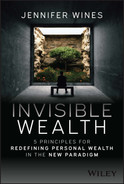Part I
When I was growing up, my grandmother had a watercolor painting hanging on the bathroom wall; it was a painting of a personified frog who was relaxing in a bubble bath while holding a glass of champagne; the painting read: you can never be too rich or too thin. The message was clear: the more money, the better; the skinnier, the better. While the painting was playful and funny, there's no denying that it played back a set of values that permeate(d) society.
I'm an immigrant and the first person in my family to attend college in the United States. Like many other millennials, I started my adult life burdened with six figures of student loan debt, starting life at a financial deficit. After graduating from undergrad and law school, I entered the world of finance. And while my profession as a wealth management advisor has provided an intimate lens into the world of the super wealthy, I've also personally experienced wealth, in every sense of the word. My life has provided insight into both ends of the financial wealth spectrum. There were times when I would watch my single mom put $3.11 worth of gas into the car just to make it to and from work (ahead of the next paycheck). There was also a time when I vacationed in the South of France on a 311‐foot superyacht. Through a myriad of experiences, both personally and professionally, I've observed, learned, and researched valuable lessons regarding wealth—within the context of our rapidly evolving world.
We are in the midst of a huge paradigm shift, rethinking what we value and therefore rethinking how we define wealth. This shift caught exponential wind during the past couple of years when our lives turned inside out (or was it outside in?), as we turned inward and reflected. The pandemic invited us to rethink, rediscover, and reinvent ourselves. We upgraded our own internal software, all the while upgrading our Zoom software. And Zoom we did, both inwards and outwards. These upgrades ushered in reinvention of self, extending to the rise of the personal brand, which now competes with the company brand. At the same time, we are seeing significant advancements in technology, thus bolstering our digital world alongside the “real” world. Toss in blockchain technology, the Great Resignation, and the fact that the entrepreneurial spirit animals are alive and well, and we have ourselves a dynamic environment. We're currently playing what feels like four‐dimensional chess.
Given this confluence of circumstances, we now have a ripe opportunity to reimagine and redefine wealth, because so much of what we value, both individually and collectively, is shifting. The way we make, invest, transact, and spend money is changing right before our eyes. We are witnessing the move from corporate cubicles to the creator economy, from dollar bills to digital dollars, and from the purchasing of things to the purchasing of experiences. As a society, we are becoming increasingly comfortable with pegging value to intangible assets, as we fundamentally always have. To put it neatly, we are shifting into a world that values intangibles over the tangibles: Invisible Wealth.
